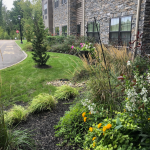Eco-Friendly Lawn Care Practices for Homeowners
Highlighting the importance of eco-friendly lawn care practices is crucial for promoting environmental sustainability. By adopting these sustainable lawn care tips and eco-friendly methods, homeowners can contribute to preserving natural resources, reducing pollution, and supporting biodiversity in their communities.
Providing an overview of the detrimental effects of traditional lawn care practices on the environment helps raise awareness about the need for change. Conventional lawn care methods often involve the use of chemical fertilizers, pesticides, and excessive water consumption, which can harm soil health, contaminate waterways, and negatively impact local ecosystems.
Green Lawn Maintenance Techniques and Sustainable Lawn Care Tips
Maintaining a lush, green lawn doesn’t have to come at the expense of the environment. By embracing green lawn maintenance techniques, homeowners can achieve beautiful and healthy lawns while promoting environmental sustainability. These practices not only enhance the vitality of your lawn but also contribute to preserving natural resources and reducing your ecological footprint.
Organic Lawn Fertilization
- Organic fertilizers offer numerous benefits for enriching soil health and promoting lush green lawns without the harmful effects of synthetic chemicals. These natural fertilizers contain organic matter that nourishes the soil and supports microbial activity.
- When applying organic fertilizers, we use techniques such as top-dressing or composting to minimize runoff and nutrient leaching. These methods ensure that nutrients are absorbed gradually by the soil, reducing the risk of pollution in waterways and promoting long-term soil fertility.
Natural Weed Control
- Instead of relying on chemical herbicides, homeowners can opt for natural weed control methods, such as hand-pulling weeds or using organic herbicides derived from plant-based ingredients. These manual and natural approaches effectively manage weed growth while minimizing environmental impact.
- Integrated weed management strategies combine different weed control techniques, including cultural practices like mowing at the proper height and overseeding to promote dense turf growth. By diversifying weed management tactics, homeowners can reduce their reliance on chemical herbicides and support a healthier lawn ecosystem.
Water Conservation
- Water conservation is essential for sustainable lawn care, especially in regions prone to drought or water scarcity. Homeowners can conserve water by investing in efficient irrigation systems that deliver water directly to the roots of plants and minimize waste.
- Proper watering schedules and techniques, such as watering in the early morning or evening to reduce evaporation, can further optimize water usage and prevent water runoff. By adjusting irrigation schedules based on weather conditions and soil moisture levels, homeowners can ensure their lawns receive adequate hydration while minimizing water waste.
Sustainable Lawn Care Tips & Lawn Mowing Practices
1. Adjust your mowing height and frequency.
Maintaining the proper mowing height is crucial for promoting healthy grass growth and root development. Homeowners should set their mower blades at the recommended height for their grass type, ensuring that only one-third of the grass blade is removed with each mowing session. This practice prevents stress on the grass and encourages deeper root growth, making lawns more resilient to drought and disease.
Adjusting the mowing frequency according to seasonal growth patterns helps maintain an optimal lawn height and appearance. During periods of rapid growth, such as spring and early summer, homeowners may need to mow more frequently to prevent grass from becoming too tall. In contrast, mowing frequency can be reduced during hot and dry weather to minimize stress on the lawn.
2. Do mulching instead of bagging
Mulching grass clippings instead of bagging them offers numerous benefits for both the lawn and the environment. As grass clippings decompose, they release valuable nutrients back into the soil, providing natural fertilization for the lawn. Additionally, mulched grass clippings act as a protective layer, retaining moisture in the soil, suppressing weed growth, and promoting overall soil health.
Leaving grass clippings on the lawn eliminates the need for bagging and disposal, reducing waste and environmental impact. By incorporating mulching into their lawn care routine, homeowners can support a more sustainable approach to lawn maintenance while improving the health and appearance of their turf.
3. Use natural pest control methods.
Beneficial Insects and Predators
Harnessing the power of nature’s allies, homeowners can cultivate habitats that attract beneficial insects like ladybugs and lacewings. These insects prey on common lawn pests such as aphids, mites, and caterpillars, helping to keep their populations in check naturally.
Employing biological pest control methods, such as introducing nematodes or predatory insects, offers an eco-friendly solution to managing lawn pests. These natural predators target specific pests without harming beneficial insects or other wildlife, creating a balanced ecosystem within the lawn.
Companion Planting
Leveraging the concept of companion planting involves strategically selecting plants that repel pests or attract beneficial insects to the lawn. For example, aromatic herbs like basil and mint can deter pests like mosquitoes and flies, while flowers such as marigolds and lavender attract pollinators and beneficial insects.
Promoting biodiversity through companion planting helps to disrupt pest cycles and reduce the likelihood of large-scale infestations. By integrating a variety of plant species into the lawn, homeowners can create a harmonious ecosystem that naturally regulates pest populations while enhancing the overall health and resilience of the turf.
Learn More Sustainable Lawn Care Tips with Bates Landscaping
At Bates Landscaping, we’re dedicated to helping you create and maintain a beautiful, sustainable lawn. By adopting eco-friendly lawn care practices, you not only enhance the health and appearance of your yard or property but also contribute to a healthier planet. Let us guide you in transitioning to organic fertilizers, natural weed control methods, water conservation techniques, and more. Together, we can make a positive impact on the environment, one lawn at a time.
Ready to transform your lawn into a green oasis? Contact Bates Landscaping today to learn more about our sustainable lawn care tips and eco-friendly lawn care services and get started on your journey to a more sustainable and beautiful outdoor space.






